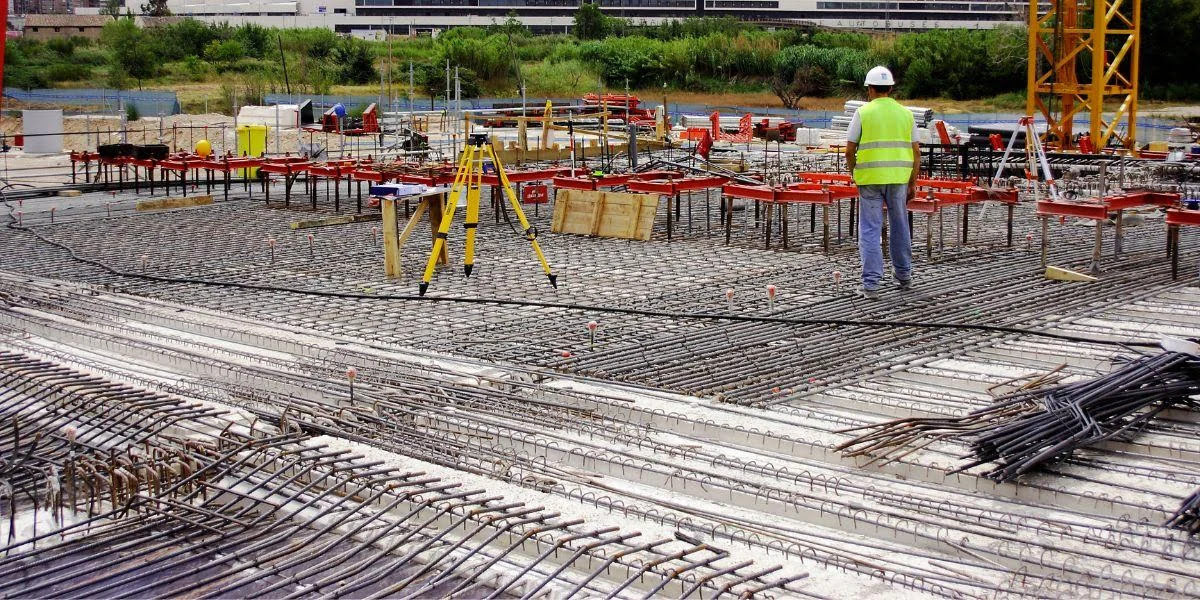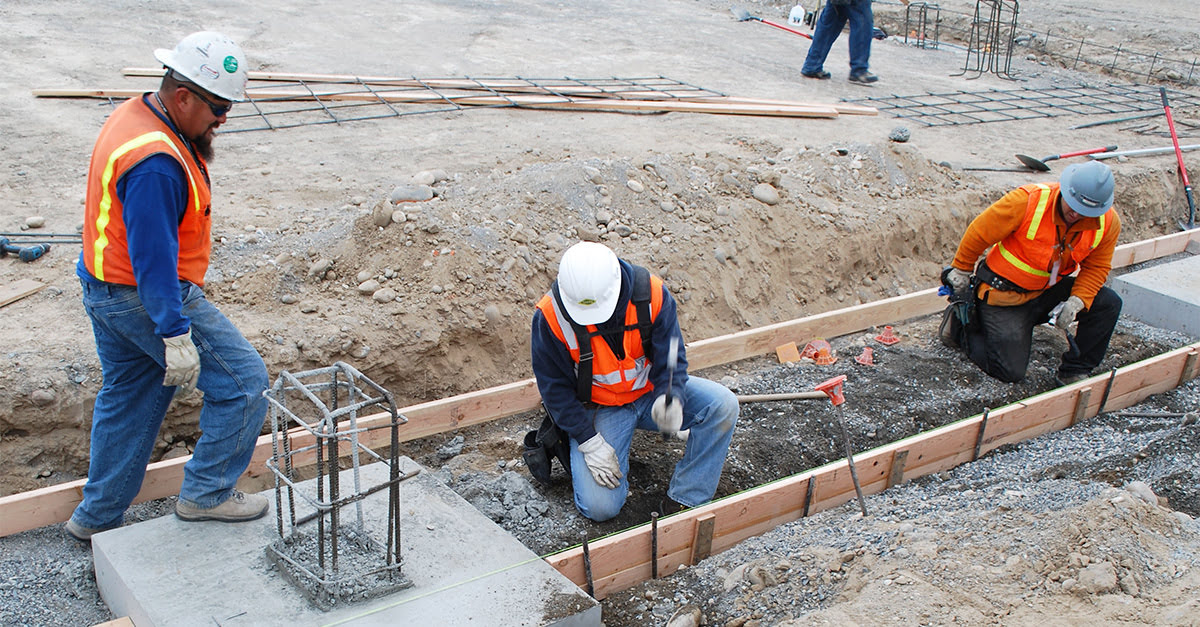Home>diy>Building & Construction>What Is Civil Work In Construction


Building & Construction
What Is Civil Work In Construction
Modified: September 1, 2024
Learn all about civil work in construction and its importance in building-construction projects. Gain insights into the various aspects and processes involved.
(Many of the links in this article redirect to a specific reviewed product. Your purchase of these products through affiliate links helps to generate commission for Storables.com, at no extra cost. Learn more)
Introduction
In the world of construction, civil work plays a crucial role in shaping our built environment. It encompasses a wide range of activities that are essential for the successful completion of construction projects. From building roads and bridges to constructing dams and airports, civil work forms the foundation of modern infrastructure.
Civil work can be defined as the branch of engineering that focuses on the design, construction, and maintenance of public works. It involves the planning, execution, and management of various construction activities that aim to enhance the quality of life for communities.
Without civil work, the grand structures and functional spaces that define our cities would simply not exist. From towering skyscrapers to intricate underground tunnels, civil work ensures that the world we live in is safe, efficient, and aesthetically pleasing.
In this article, we will explore the importance of civil work in the field of construction, the various types of civil work, the common procedures involved, the materials used, the role of civil engineers, and the challenges and risks associated with civil work.
Whether you are embarking on a construction project or simply interested in understanding the complexities of civil work, this article will provide you with valuable insights into this vital aspect of the construction industry.
Key Takeaways:
- Civil work is crucial for building roads, bridges, and other structures that keep our cities connected and safe. It also helps improve our quality of life by providing essential amenities like clean water and efficient transportation.
- Civil engineers play a vital role in ensuring the success of construction projects by overseeing planning, design, and execution. They work to create safe, sustainable, and functional built environments for our communities.
Read more: What Is Heavy Civil Construction
Definition of Civil Work
Civil work is a broad term that encompasses a wide range of construction activities related to the development and maintenance of public infrastructure. It involves the design, construction, and management of various projects that are fundamental to our society’s functioning and well-being.
Civil work primarily focuses on creating and maintaining structures and facilities that serve the public, such as roads, bridges, buildings, dams, airports, water and sewage systems, and more. The aim of civil work is to ensure the safe, efficient, and sustainable operation of these infrastructure projects.
One of the key aspects of civil work is that it is carried out in the public domain and is often funded by government agencies or public-private partnerships. The nature of civil work requires an in-depth understanding of engineering principles, construction techniques, and project management.
Furthermore, civil work involves collaboration with various stakeholders, including architects, urban planners, environmental consultants, and regulatory bodies, to ensure that projects meet legal requirements, adhere to safety standards, and have minimal impact on the environment.
Overall, civil work can be seen as the backbone of our modern society. It is responsible for the creation and maintenance of the infrastructure that keeps our cities and communities connected, functional, and prosperous.
Now that we have a better understanding of what civil work entails, let us delve deeper into why it is so important in the field of construction.
Importance of Civil Work in Construction
Civil work is of paramount importance in the construction industry and has numerous significant roles. Let us explore why civil work holds such a crucial place in the field of construction:
1. Infrastructure Development:
Civil work plays a vital role in the development of infrastructure. It involves the construction of essential public facilities like roads, bridges, airports, railways, and buildings. These structures are the backbone of any thriving economy and are essential for societal growth and connectivity.
2. Public Safety:
Civil work prioritizes the safety of the public by ensuring the structural integrity and stability of buildings and infrastructure. Civil engineers employ advanced engineering principles and techniques to analyze and design structures that can withstand various forces, such as earthquakes, wind loads, and heavy traffic.
Read more: What Do Civil Engineers Do In Construction
3. Urban Planning and Design:
Civil work is crucial in urban planning and design. Civil engineers and urban planners work together to create functional and aesthetically pleasing cities. They plan the layout of roads, develop efficient transportation systems, establish sustainable drainage systems, and design public spaces to enhance the quality of life for residents.
4. Economic Growth:
Civil work is a driving force behind economic growth. Infrastructure development stimulates economic activity by creating job opportunities, attracting investments, and improving transportation networks. It also enhances the overall productivity and competitiveness of a region or country.
5. Environmental Sustainability:
Civil work is increasingly focused on incorporating sustainable practices. Civil engineers aim to minimize the environmental impact of construction projects by using eco-friendly materials, implementing energy-efficient technologies, and designing green infrastructure. This helps in conserving resources and reducing carbon emissions.
6. Enhancing Quality of Life:
Civil work directly contributes to improving the quality of life for residents. It provides essential amenities such as clean water supply, efficient sewage systems, well-maintained roads, and reliable public transportation. These services enhance convenience, accessibility, and overall well-being within communities.
In summary, civil work is indispensable in the construction industry. It plays a pivotal role in infrastructure development, public safety, urban planning, economic growth, environmental sustainability, and improving the quality of life for individuals. Without civil work, our society would lack the essential structures and facilities that are essential for progress and prosperity.
Read more: What Are MEP Works In Construction
Types of Civil Work
Civil work encompasses a wide range of construction activities, each serving a specific purpose and requiring specialized knowledge and skills. Here are some of the common types of civil work:
1. Road Construction:
Road construction involves the design, construction, and maintenance of roadways and highways. It includes activities such as grading, pavement construction, signage installation, and drainage systems. Road construction is essential for ensuring efficient transportation and connectivity between different areas.
2. Bridge Construction:
Bridge construction focuses on building structures that provide passage over obstacles such as rivers, valleys, or highways. It involves careful engineering and the use of various construction materials to create safe and durable bridges. Bridge construction requires expertise in structural engineering and advanced construction techniques.
3. Building Construction:
Building construction involves the creation of residential, commercial, and industrial structures. It includes activities like excavation, foundation construction, framing, plumbing, electrical work, and interior finishing. Building construction requires coordination among multiple trades and adherence to building codes and regulations.
Read more: What Is Punch Work In Construction
4. Dam Construction:
Dam construction involves the building of barriers across rivers and streams to control water flow and generate hydroelectric power. It requires careful planning and engineering to ensure the stability and functionality of the dam structure. Dam construction is vital for water storage, irrigation, flood control, and power generation.
5. Airport Construction:
Airport construction focuses on the development of airports and associated infrastructure. It involves runway construction, terminal building construction, installation of navigation systems, and the creation of passenger facilities. Airport construction requires adherence to strict safety regulations and international standards.
6. Water and Sewage Systems:
Water and sewage system construction involves the installation of pipelines, reservoirs, pumps, and treatment facilities for the supply of clean water and the disposal of wastewater. It includes activities like pipeline laying, excavation, trenching, and the implementation of filtration and purification systems.
7. Landscaping and Beautification:
Landscaping and beautification work focuses on enhancing the aesthetic appeal of public spaces. It includes activities like planting trees, creating gardens, installing fountains, and designing outdoor recreational areas. Landscaping and beautification contribute to the overall livability and attractiveness of cities and communities.
These are just a few examples of the diverse types of civil work. Each type requires specific expertise, equipment, and techniques to ensure successful completion. Skilled civil engineers and construction professionals play a crucial role in executing these projects efficiently and effectively.
Read more: What Is Mechanical Work In Construction
Common Procedures Involved in Civil Work
Civil work involves a series of essential procedures that are carried out to ensure successful project completion. These procedures vary depending on the specific type of civil work being undertaken. Here are some of the common procedures involved in civil work:
1. Planning and Design:
The first step in any civil work project is meticulous planning and design. This involves conducting surveys, analyzing site conditions, and creating detailed project plans. Engineers and architects collaborate to develop designs that meet the project’s objectives while adhering to safety, environmental, and regulatory requirements. This stage also includes obtaining necessary permits and approvals.
2. Site Preparation:
Site preparation involves clearing the construction area and leveling the ground. This may include land excavation, removal of vegetation, and relocating utilities such as water lines or electric cables if necessary. Proper site preparation ensures a suitable foundation for the construction project.
3. Excavation and Earthwork:
Excavation and earthwork involve digging and removing soil or rock to create foundations, trenches, or underground structures. This process also includes grading and compacting the soil to achieve the desired elevation and slope. Excavation requires heavy equipment such as excavators, bulldozers, and dump trucks, operated by skilled operators.
Read more: What Is Finish Work In Construction
4. Foundation Construction:
The foundation is a critical element in civil work. It is constructed to provide stability and support to the structure. Foundation construction typically involves pouring or placing concrete footings or pilings into the excavated area. The choice of foundation depends on factors such as soil properties, structure design, and load-bearing capacity requirements.
5. Structural Construction:
Once the foundation is in place, the structural construction begins. This involves assembling and erecting the main framework of the structure using various construction materials like concrete, steel, or wood. Skilled workers and construction teams work together to construct walls, columns, beams, and floors, following the design specifications.
6. Utility and System Installation:
Utility and system installation involves the installation of various systems necessary for the functioning of the structure. This may include plumbing, electrical, heating, ventilation, and air conditioning (HVAC), fire protection, and communication systems. Certified professionals ensure the proper installation and connections of these systems as per the design and local codes.
7. Finishing and Interior Work:
Finishing and interior work focus on the aesthetic and functional aspects of the structure. This includes activities like painting, tiling, flooring, installation of fixtures, cabinetry, and other interior elements. Skilled craftsmen and tradespeople work on detailing, ensuring quality, and creating a visually appealing interior space.
Read more: What Is Excavation Work In Construction
8. Exterior and Site Work:
Exterior and site work involve completing the exterior elements of the structure and developing the surrounding site area. This may include landscaping, paving, installation of sidewalks, parking lots, and outdoor amenities like lighting fixtures or recreational spaces. Proper exterior and site work enhance the overall appearance and usability of the project.
These are some of the common procedures involved in civil work. Each of these steps requires careful planning, skillful execution, and adherence to safety and quality standards. Project managers, engineers, and construction teams work together to ensure a smooth and successful completion of the civil work project.
Materials Used in Civil Work
Civil work involves the use of various construction materials that provide strength, durability, and functionality to the structures and infrastructure being built. The choice of materials depends on factors such as project requirements, environmental conditions, and budget considerations. Here are some of the commonly used materials in civil work:
1. Concrete:
Concrete is one of the primary materials used in civil work. It is a versatile and durable building material made by combining cement, aggregates (such as sand and gravel), water, and sometimes admixtures. Concrete is used for constructing foundations, slabs, columns, beams, and other structural components.
2. Steel:
Steel is another essential material in civil work. It offers strength, flexibility, and resistance to various forces. Steel is used for reinforcing concrete structures, such as rebars, as well as for constructing columns, beams, and trusses. It is also used for manufacturing bridges, tunnels, and other infrastructure projects.
Read more: What Is A Work Order In Construction
3. Bricks and Blocks:
Bricks and blocks are widely used in construction for building walls, facades, and partitions. Bricks can be made of clay, concrete, or other materials, while blocks are typically made of concrete. These materials provide structural integrity and thermal insulation to the building.
4. Asphalt:
Asphalt is a mixture of bitumen, aggregates, and fillers and is commonly used for paving roads, driveways, and parking lots. It provides a smooth and durable surface that can withstand heavy traffic loads and various weather conditions.
5. Timber:
Timber, or wood, is used for various purposes in civil work, including framing structures, formwork, and interior finishes. Wood is appreciated for its natural beauty, availability, and versatility. However, proper treatment and maintenance are required to protect it from decay and pests.
6. Aggregates:
Aggregates, such as sand, gravel, crushed stone, and slag, are used as fillers in concrete and for road construction. They provide bulk and stability to the construction materials and play a crucial role in determining the strength and durability of the finished structure.
Read more: What Is A Scope Of Work In Construction
7. Plastics and Polymers:
Plastics and polymers are increasingly being used in civil work due to their lightweight, durability, and resistance to corrosion. They are commonly used for applications such as pipes, drainage systems, waterproofing membranes, and insulation materials.
8. Glass and Aluminum:
Glass and aluminum are used in the construction of windows, doors, facades, and curtain walls. They provide transparency, aesthetics, and thermal performance to the building, while aluminum offers lightweight and corrosion-resistant properties.
These are just a few examples of the wide range of materials used in civil work. Each project may require a unique combination and application of materials to ensure structural integrity, functionality, and visual appeal. Civil engineers, architects, and construction professionals carefully select and use these materials to create safe, durable, and aesthetically pleasing structures and infrastructure.
Role of Civil Engineers in Construction Projects
Civil engineers play a crucial role in construction projects, overseeing the planning, design, and execution of various civil works. They bring technical expertise, problem-solving skills, and an understanding of construction principles to ensure the successful completion of projects. Here are some key roles of civil engineers in construction:
1. Project Planning and Design:
Civil engineers are involved in the early stages of a project, contributing to the planning and design process. They analyze project requirements, conduct site surveys, and work closely with architects and other professionals to create detailed designs and specifications. They consider factors such as structural integrity, sustainability, safety, and compliance with local regulations.
2. Structural Analysis and Engineering:
Civil engineers are responsible for analyzing the strength and stability of structures. They use engineering principles and software tools to calculate load-bearing capacities, assess the impact of forces such as gravity, wind, and earthquakes, and determine appropriate structural systems and materials. Their expertise ensures that buildings and infrastructure are safe and can withstand various environmental and operational conditions.
3. Procurement and Project Management:
Civil engineers are involved in the procurement process, collaborating with contractors, suppliers, and vendors to acquire the necessary materials, equipment, and services for construction projects. They also play a key role in project management, overseeing timelines, budgets, and resources, coordinating the work of various teams, and ensuring efficient progress throughout the project’s lifecycle.
4. Construction Supervision:
Civil engineers provide on-site supervision and monitoring to ensure that construction activities align with the approved plans and specifications. They conduct regular inspections, manage quality control, and address any issues or challenges that may arise during the construction process. Their presence ensures that construction work meets design standards and safety protocols.
5. Performance and Maintenance:
Civil engineers assess the performance of completed projects and provide recommendations for maintenance and improvements. They conduct inspections, monitor structural conditions, and analyze data to ensure ongoing safety and functionality. They also contribute to the development of maintenance plans and provide expertise during renovations or expansions of existing structures.
Read more: How To Work In Construction
6. Environmental and Sustainable Design:
Civil engineers are increasingly involved in incorporating sustainable practices into construction projects. They consider environmental factors and resource efficiency when selecting materials, designing systems, and implementing technologies. They work towards minimizing the environmental impact of construction and strive to create sustainable and resilient infrastructure.
7. Collaboration and Communication:
Civil engineers collaborate with various stakeholders, including architects, contractors, government agencies, and clients. They communicate technical information effectively, translate design concepts into construction plans, and facilitate coordination among different teams. Their ability to collaborate ensures that projects are executed smoothly and meet the desired objectives.
Overall, civil engineers play a fundamental role in construction projects, ensuring the successful implementation and delivery of infrastructure. Their technical expertise, attention to detail, and commitment to safety and sustainability contribute to the creation of functional and resilient built environments.
Challenges and Risks in Civil Work
Civil work involves complex and multifaceted construction projects, and as such, there are several challenges and risks that need to be addressed and managed effectively. Here are some common challenges and risks in civil work:
1. Uncertain Weather Conditions:
Weather conditions can have a significant impact on civil work projects. Extreme temperatures, heavy rainfall, strong winds, or freezing conditions can delay construction activities and affect the quality of the work. Mitigating weather-related risks requires careful planning, scheduling flexibility, and implementing appropriate construction methods to ensure the project is not significantly affected.
Read more: What Is Chainage In Civil Engineering
2. Geological and Geotechnical Issues:
The presence of challenging geological conditions, such as unstable soil, rock formations, or groundwater, can pose risks during civil work. These conditions can affect the stability of the foundation, slope stability, and the overall safety of the structure. Proper geotechnical investigations, engineering analysis, and the implementation of appropriate solutions, such as soil stabilization techniques, are essential to mitigate these risks.
3. Cost Overruns and Budget Constraints:
Civil work projects often face challenges related to budgeting and cost management. Unforeseen changes in design, material price fluctuations, labor costs, or unexpected site conditions can lead to cost overruns. Effective project planning, diligent monitoring of expenses, and regular communication with stakeholders are necessary to manage budget constraints and keep the project financially viable.
4. Regulatory Compliance and Permitting:
Complying with regulatory requirements, obtaining permits, and navigating through various zoning and environmental regulations can be a complex and time-consuming process. Failure to meet regulatory obligations can lead to delays, fines, or even project cancellations. Engaging knowledgeable professionals and maintaining open communication with regulatory authorities can help minimize the risks associated with compliance.
5. Safety Hazards and Accidents:
Civil work involves working with heavy machinery, working at heights, and exposure to hazardous materials, which can pose significant safety risks. Construction sites are prone to accidents and injuries if proper safety measures and protocols are not in place. Regular safety inspections, training programs, and the enforcement of safety guidelines are paramount to ensure the well-being of workers and minimize the risk of accidents.
Read more: What Is Surveying In Civil Engineering
6. Resource Management and Logistics:
Efficient management of resources, such as labor, equipment, and materials, is essential for the smooth progression of civil work projects. Delays in the delivery of supplies, equipment malfunctions, or inadequate workforce allocation can disrupt the project schedule and affect productivity. Effective project planning, communication with suppliers, and proactive logistics management are crucial in overcoming these challenges.
7. Environmental Impact and Sustainability:
Civil work projects can have significant environmental impacts, including land disturbance, pollution, and the depletion of natural resources. Increasing awareness of environmental issues has led to stricter regulations and the need to design and construct projects with sustainability in mind. Integrating sustainable practices, such as using eco-friendly materials, implementing energy-efficient systems, and incorporating green infrastructure, can help mitigate environmental risks and ensure long-term sustainability.
While these challenges and risks are inherent in civil work, proactive risk management, effective communication, collaboration, and a commitment to continuous improvement can help mitigate these risks and ensure the successful completion of construction projects.
Conclusion
Civil work is a fundamental aspect of the construction industry, encompassing a wide range of activities that contribute to the development and maintenance of our built environment. From constructing roads and bridges to building dams and airports, civil work plays an essential role in shaping our modern infrastructure.
Throughout this article, we have explored the definition of civil work and its importance in construction. We have discussed the various types of civil work, including road construction, bridge construction, building construction, dam construction, airport construction, water and sewage systems, as well as landscaping and beautification.
We have also delved into the common procedures involved in civil work, such as planning and design, site preparation, excavation and earthwork, foundation construction, structural construction, utility and system installation, finishing and interior work, and exterior and site work. These procedures require careful planning, skilled execution, and adherence to safety and quality standards.
Moreover, we have explored the materials used in civil work, including concrete, steel, bricks and blocks, asphalt, timber, aggregates, plastics and polymers, glass, and aluminum. Each material serves a specific purpose and contributes to the strength, durability, and functionality of the structures being constructed.
We have also highlighted the critical role of civil engineers in construction projects. From project planning and design to construction supervision and performance evaluation, civil engineers bring technical expertise, problem-solving skills, and knowledge of construction principles to ensure the successful completion of projects. Their role is pivotal in creating safe, sustainable, and functional built environments.
However, civil work also presents its fair share of challenges and risks. Uncertain weather conditions, geotechnical issues, cost overruns, regulatory compliance, safety hazards, resource management, and environmental impact are some of the challenges that need to be effectively managed to ensure project success.
In conclusion, civil work is a vital pillar of the construction industry, playing a critical role in infrastructure development, public safety, urban planning, economic growth, and the overall enhancement of our quality of life. It requires the collaboration of skilled professionals, including civil engineers, architects, contractors, and regulatory authorities, to overcome challenges, mitigate risks, and deliver successful construction projects.
By continuously embracing technological advancements, incorporating sustainable practices, and maintaining a commitment to innovation and excellence, the field of civil work will continue to shape and transform our built environment to meet the evolving needs of society.
Frequently Asked Questions about What Is Civil Work In Construction
Was this page helpful?
At Storables.com, we guarantee accurate and reliable information. Our content, validated by Expert Board Contributors, is crafted following stringent Editorial Policies. We're committed to providing you with well-researched, expert-backed insights for all your informational needs.




0 thoughts on “What Is Civil Work In Construction”